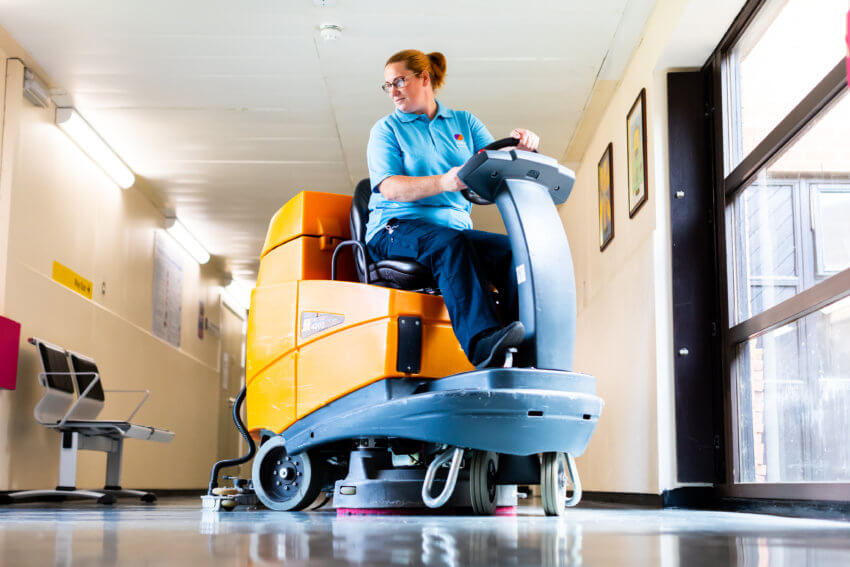The Future of Healthcare Facilities Management
It has been a disruptive year for the healthcare industry so far. What lessons can healthcare estate facilities managers take forward into 2022?
"Challenging the unknown required seamless collaboration to adopt how we approached unusual obstacles with imaginative solutions, taking purposeful action fast".
Alice Woodwark, Managing Director Mitie Communities

Improving Healthcare in 2022: Five Critical Insights for Facilities Managers
2021 has been another disruptive year for the healthcare industry. The number of patients waiting for treatment hit a record high of *4.7 million. By February, waiting times for **0.4 million patients reached upward of a year, presenting hospital staff with the mammoth task of trying to claw back elective surgery delays.
Meanwhile, the Government committed £1 billion to provide extra health checks, scans and additional operations or procedures. While testing centres continued to operate, temporary centres opened their doors to cope with the mass vaccine rollout.
Against this backdrop, healthcare estate managers and providers found themselves needing to be even more adaptive and responsive. They needed to work in partnership like never before.
So, what lessons can healthcare estate facilities managers take forward into 2022? And what topics should be on your checklist?
1. The frontline deserves a louder voice
The pandemic undoubtedly spotlighted healthcare – not just the frontline NHS heroes, but also the work carried out in our hospitals, health centres and care homes. Those people performed a vital role in overcoming the challenges facing NHS trusts and have earned a louder voice in the future.
We’ve invested in understanding how to make happier and healthier workplaces that work better for the patients and staff who use them. To help us do this, we’ve brought together clients’ employees from multiple sites in shared working sessions. This has given them a voice in how workplaces can facilitate closer collaboration, improved mental health and wellbeing and better service delivery. The outcomes have been positive, especially where this has been in a healthcare setting.
2. Collective problem solving can unlock better, faster responses
The need to work closely together and quickly harness individual skillsets and experience was critical during the pandemic.
At Mitie, we saw that working collaboratively with stakeholders could help us overcome healthcare challenges in unexpected new ways. Agile problem-solving became an essential part of our service, particularly in life-saving healthcare scenarios. In partnership with the British Army and EY, we solved unsurmountable problems caused by the pandemic. We built NHS Nightingale Hospital Northwest; one of seven emergency response field hospitals created in the UK at the beginning of the pandemic in 2020.
Challenging the unknown required seamless collaboration to adopt how we approached unusual obstacles with imaginative solutions, taking purposeful action fast.
Thinking differently and collaboratively with all stakeholders can overcome challenges in unexpected and innovative ways – something that Savvy healthcare estates managers will look to retain this agility as we go into 2022 and beyond.
3. Get ready for awareness of cleaning standards
With the new NHS National Standards of Healthcare Cleanliness 2021***, hygiene will become more visible. Patients and visitors will be increasingly aware of each hospital’s rating, which could impact their assessment of the quality of care they’re receiving.
Our Science of Service approach means we are bringing together innovation and intelligence to work alongside our staff, ensuring better and more measurable outcomes in frontline environments. For example, in addition to our Hygiene 360 technology efficiencies, we’re also using ultraviolet robotic cleaners. These can handle a more significant burden of potential infection, which provides much higher confidence levels in cleaning regimes.
4. Technology can help us work smarter, not harder
Intensive cleaning schedules need to work efficiently to ensure they fit purposefully and achieve the necessary hygiene standards.
We’re using technology to support the frontline workforce. Our Hygiene 360 technology enables us to track usage of an area for our NHS trust clients. If usage increases, for example, in a bathroom, our staff can respond to this and clean it more often. If usage goes down, we know we can clean it less often.
Utilising this technology allows us to inform shift patterns and allocate resource to where it’s needed most. Meanwhile, the cleaning teams can see how their hard work adds real value at critical times and helps to improve patient outcomes.
A recently secured £92.5m contract to support the John Radcliffe Hospital includes introducing new systems across all services. This includes the use of advanced task scheduling, prioritisation, and indoor location monitoring software. When support with essential tasks is needed – such as patient transfers or cleaning – clinical teams can raise a request on the system, which will alert the closest available Mitie colleague. This will help efficiently manage clinical staff’s time and tasks, improving the overall patient experience.
5. There will be a stronger focus on green PPE
The increased use of PPE and cleaning materials to protect the health of our people and ensure patient safety is here to stay, at least in the medium term.
However, we have a further responsibility to achieve this sustainably. A new study in the Journal of the Royal Society of Medicine looked at the carbon footprint of PPE provided to health and social care staff in England during the first six months of the Covid-19 pandemic. The startling conclusion found that it represented the ****equivalent of flying from London to New York 244 times every day!
We’re undertaking a full review that accepts that things have changed. We know we can’t simply stick with the quick, short-term solutions we seized upon in March 2020.
If you think all the answers in future-proofing healthcare facilities management are foregone conclusions, they’re not. We’re constantly evolving and adapting in the most creative and resilient ways, with so much to continually learn.
Only through collaboration throughout 2022 can we circumvent negative outcomes across NHS Trusts by applying agile healthcare FM.
* House of Commons Library; Waiting lists for elective surgical operations https://commonslibrary.parliament.uk/research-briefings/cdp-2021-0058/
** House of Commons Library; Waiting lists for elective surgical operations https://commonslibrary.parliament.uk/research-briefings/cdp-2021-0058/
*** Mitie NHS National Standards of Healthcare Cleanliness 2021 by Martyn Hearne.
**** Environmental impact of personal protective equipment distributed for use by health and social care services in England in the first six months of the COVID-19 pandemic https://journals.sagepub.com/doi/full/10.1177/01410768211001583
Popular Content

Intelligent Healthcare
The future of healthcare is evolving rapidly with advances in digital healthcare technologies. Mitie’s unrivalled approach combines a human approach with technology to facilitate an earnest, empathetic and efficacious service.

Four Challenges Facing Healthcare FM Managers During COVID-19 Recovery…
What four main challenges are healthcare facilities managers facing in the pandemic? And what ways can facilities management partners support them?

The National Cleanliness Standards
Learn how Mitie uses a combination of technology and human approach, in line with the National Standards of Healthcare Cleanliness.
How can we help?
If you’re looking for more information, need to talk to someone about an enquiry or want to chat about your service needs, then you’ve come to the right place.
Please fill in our short form and a member of our Healthcare team will be in touch.
 Skip to content
Skip to content